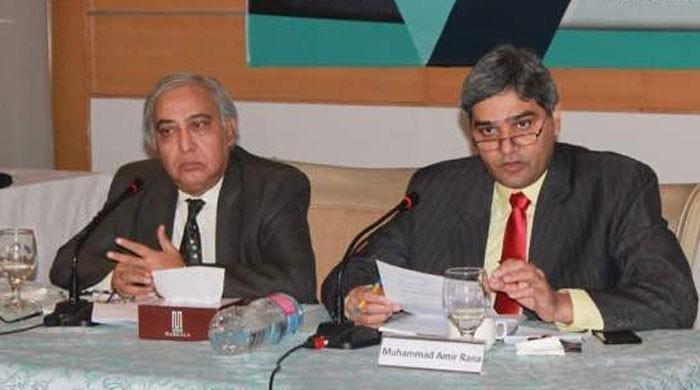Counter terrorism experts demand internal security policy under parliamentary supervision
May 03, 2017

ISLAMABAD: The counterterrorism experts have called for formulation of comprehensive internal security policy which must be supervised by the parliamentary committee on national security.
“People sitting at the helm of affairs overseeing the counter terrorism and violent extremism issues must adopt a holistic internal security policy which is need of the hour,” the experts unanimously said during the working group session on “Internal security and challenges”.
The meeting was the tenth in a series of sessions aimed at countering violent extremism, organised by Pak Institute for Peace Studies (PIPS), an Islamabad-based think tank.
The participants also showed their concern regarding the radicalization of the police force with particular reference to Mumtaz Qadri, a former police constable who was hanged last year following the Supreme Court verdict for committing the murder of ex-governor Punjab.
A former police chief disclosed that Mumtaz Qadri was sent to police lines when he was a part of the security of Tariq Pervaiz, a former Director General of FIA with his note that he has some extremist tendencies so he should not be assigned any sensitive duty including the security of important persons.
The experts present at the conference were of the view that the country faces multiple internal security challenges. Instead of coming with reactive, incoherent responses, a consolidated internal security policy be devised, which addresses those challenges.
The group called for revisiting the entire approach and vision of the internal security, moving beyond the hurried responses to any militant attack.
The new approach should adopt some sort of conceptual framework to produce internal security policy, having measures to kerb extremism, militancy, organised crimes, and separatist tendencies. Not only that, it should also have measures warning about the internal fallout of strategic priorities, governing of cyberspaces, and securing the country’s borders.
The members argued this revised framework should also incorporate elements from the angle of human security.
Several suggestions came from the group to implement this framework. First most, saying that the parliament shall take lead in overseeing internal security policy; specifically, the parliamentary committee on national security should among other things, re-assess strategic priorities and mainstream marginalised areas and community.
It was shared that extremists often find space in marginalised areas where normal application of law is ambiguous or uncertain.
The suggested internal security policy should incorporate key counter-terror initiatives like National Action Plan, though after revising it first.
Overall, all institutions, the group suggested, should be made to coordinate with each other, bringing in some sort of accountability mechanisms in case of any lapse.
One specific suggestion was to review the ways in which different institutions perceive the threat, to learn gaps therein and correct them. Several members called for civilian law-enforcement agencies to take the lead in any drive against militancy.
They said that the capacity of such agencies can be built over time. To repose trust in the internal security policy, the group called, the policy should also consider fundamental human rights.
The group reiterated that justice and governance reforms are must to eliminate extremism in the long run. Members reminded that the NAP calls for reconciling disgruntled Baloch.
Members who attended the session included Tariq Khosa, former Inspector General of Police (IGP), Afrasiab Khattak, former senator, Dr. Khalid Masud, ex-chairman of Council of Islamic Ideology, Dr. Qibla Ayaz, former Vice Chancellor, University of Peshawar, Ammar Khan Nasir, religious scholar, Fayyaz Toru, former IGP, Gen. (Retd.) Masood Aslam, defence analyst, Dr. Suhail Habib Tajik, Gen (Retd.) Talat Masood, defense analyst, Muhammad Ziauddin, Zia ur Rehman, Sabookh Syed, Zahid Hussain, Marvi Sirmed, Syed Arfeen, Muhammad Amir Rana.











